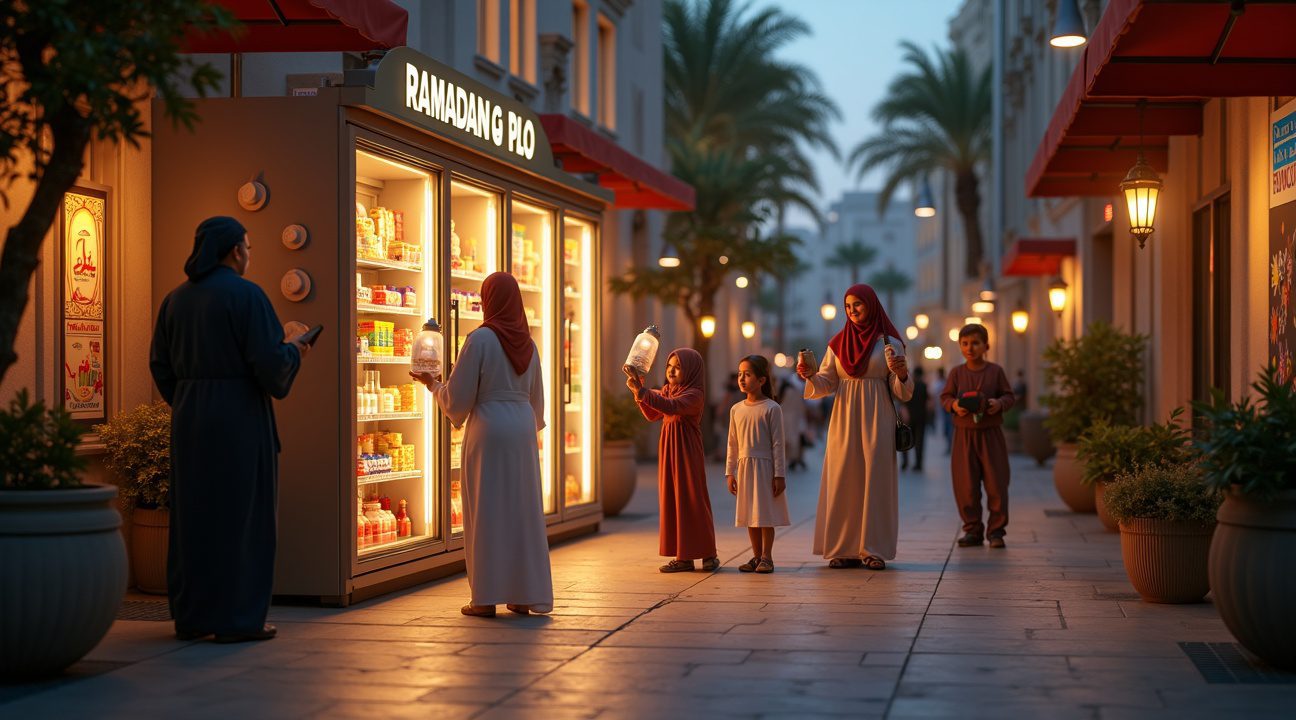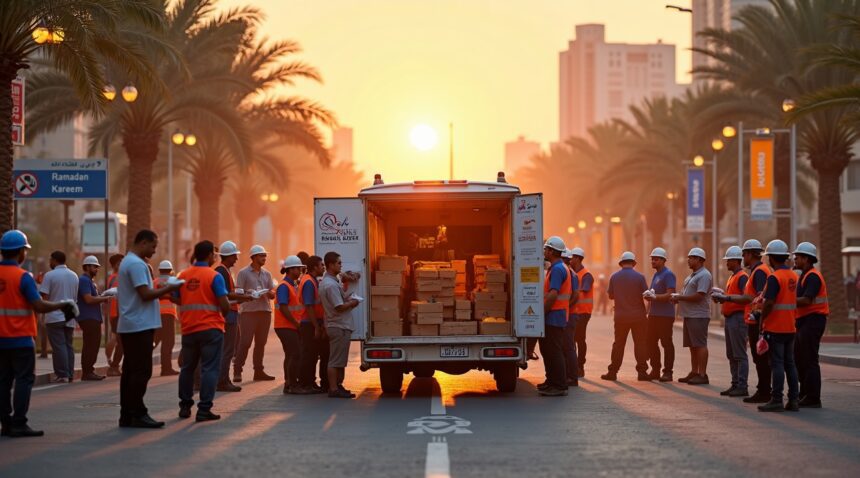Dubai Launches Ambitious Street Freezer Initiative During Ramadan 2025
Dubai has introduced a groundbreaking food security initiative during Ramadan 2025, providing over 100,000 free meals to underserved communities through an innovative coalition between UAE Food Bank, Majid Al Futtaim, Carrefour, and Taya Art Production.
This collaborative effort utilizes mobile Care Vans and strategically located street freezers to offer continuous access to nutritious meals, specifically serving construction workers, domestic staff, and economically challenged families. The program’s design ensures it goes beyond the month of Ramadan, promoting food sustainability throughout the year.
Key Takeaways
- Delivery Mechanism: Over 3,300 meals are distributed daily via Care Vans operating at busy intersections, transit points, and construction sites where vulnerable groups are most concentrated.
- Comprehensive Strategy: The initiative expands upon traditional Ramadan iftar distributions, incorporating permanent street freezer stations for broader year-round support.
- Multi-Organizational Support: The program is a coordinated effort—UAE Food Bank manages logistics, Majid Al Futtaim delivers retail support, Carrefour supplies essential ingredients, and Taya Art Production oversees meal preparation.
- Sustainability Focus: Surplus food is redirected from waste streams to meal distribution, reducing environmental impact and reinforcing a circular food economy.
- Recipient Dignity & Access: Strategic locations ensure that people can access meals without facing bureaucratic hurdles or stigma, empowering routine and respectful food retrieval.
The street freezer initiative stands as a model for sustainable community care, combining resource efficiency with compassionate outreach while reinforcing Dubai’s commitment to social welfare and food equity.
Dubai Distributes 100,000 Free Meals to Vulnerable Communities During Ramadan 2025
I’ve observed a remarkable expansion of Dubai’s humanitarian efforts this Ramadan, with the UAE Food Bank and Majid Al Futtaim joining forces to deliver an unprecedented scale of support. This partnership distributes over 3,300 free meals daily throughout the holy month, culminating in a total of 100,000 meals for vulnerable communities across the emirate.
The logistics behind this massive undertaking demonstrate Dubai’s commitment to ensuring no one goes hungry during Ramadan. Care Vans serve as mobile distribution centers, strategically positioned at busy locations where workers and those in need congregate. These vehicles don’t simply park randomly – they’re deployed based on careful analysis of foot traffic patterns and community needs.
Strategic Distribution Network Maximizes Impact
The distribution strategy extends beyond traditional meal delivery through multiple touchpoints across the city. Key elements of this comprehensive approach include:
- Daily iftar meals delivered directly to workers at construction sites and labor accommodations
- Distribution of dates and water at major intersections during peak hours
- Strategic placement at transit points where vulnerable populations frequently gather
- Coordinated timing to ensure meals reach recipients when most needed
This multi-pronged approach ensures the Free Meals Initiative reaches diverse segments of Dubai’s vulnerable population. Construction workers receive hot iftar meals at their work sites, while commuters and daily laborers can access dates and water at busy intersections. Transit hubs serve as additional distribution points, capturing those who might otherwise be missed by traditional charity networks.
The scale of this operation reflects Dubai’s broader vision for community welfare and food security. By partnering with established organizations like Majid Al Futtaim, the initiative leverages existing supply chains and distribution expertise to maximize efficiency. This collaboration demonstrates how public-private partnerships can amplify charitable efforts during critical periods.
Each Care Van operates on a predetermined route, visiting specific locations at consistent times to establish reliability for recipients. Workers know they can depend on these mobile units appearing at designated spots, creating a safety net that extends beyond the physical provision of food. This predictability helps vulnerable community members plan their days around guaranteed meal access.
The choice to focus on intersections and transit points isn’t arbitrary – these locations capture people during their most vulnerable moments. Day laborers waiting for work opportunities, domestic workers traveling between assignments, and others facing economic hardship often gather at these spots. By bringing food directly to these areas, the initiative eliminates barriers that might prevent people from accessing traditional charity distribution centers.
The timing during Ramadan amplifies the cultural and spiritual significance of this effort. Food distribution during iftar hours aligns with Islamic principles of charity and community support, while dates and water provide traditional breaking-of-fast sustenance. This cultural sensitivity enhances the program’s impact beyond mere nutrition, offering dignity and respect to recipients.
Dubai’s approach to addressing food insecurity through this initiative creates a template for other cities facing similar challenges. The combination of daily meal distribution and strategic placement of refreshment stations addresses both immediate hunger and ongoing nutritional needs. This dual approach recognizes that vulnerability takes many forms – from the construction worker who missed lunch to the family struggling with grocery costs.
The 100,000 meal target represents more than numbers on a spreadsheet. Each meal delivered through this initiative supports someone’s ability to maintain their strength, focus on work, or simply get through another day. For many recipients, these meals provide the only guaranteed nutrition they’ll receive, making the consistency and quality of delivery absolutely critical.
The success of this massive undertaking relies on coordination between multiple stakeholders, from the UAE Food Bank’s distribution expertise to Majid Al Futtaim’s logistical capabilities. This collaboration showcases how Dubai builds massive initiatives that serve its most vulnerable residents while strengthening community bonds during this sacred month.
How Major Partners Coordinate Dubai’s Largest Ramadan Food Distribution Effort
The success of Dubai’s ambitious street freezer initiative stems from a carefully orchestrated partnership between four key organizations. Each entity brings specialized expertise that creates a comprehensive food distribution network reaching vulnerable communities across the emirate.
Strategic Partner Roles and Responsibilities
UAE Food Bank serves as the primary coordinator, leveraging its established infrastructure and community connections to identify distribution points and beneficiary groups. Majid Al Futtaim provides the retail network foundation, utilizing its extensive local presence to support logistical operations and community outreach efforts.
Carrefour takes responsibility for sourcing and supplying essential ingredients, focusing on meat products and grocery staples needed for nutritious meal preparation. The supermarket chain’s procurement capabilities ensure consistent quality and availability of fresh ingredients throughout the Ramadan period. Meanwhile, Taya Art Production handles the operational aspects of meal preparation, transforming raw ingredients into ready-to-consume meals that maintain cultural authenticity and nutritional standards.
Sustainable Food Distribution Model
This partnership emphasizes environmental responsibility through strategic surplus food redistribution. Rather than allowing excess inventory to go to waste, the collaboration redirects these resources into meaningful community support. The model demonstrates how large-scale food initiatives can simultaneously address hunger and reduce environmental impact.
Each organization contributes its core competencies while maintaining operational efficiency:
- UAE Food Bank‘s community expertise combines with Majid Al Futtaim‘s retail infrastructure to create optimal placement strategies for street freezers.
- Carrefour‘s supply chain management ensures consistent food quality.
- Taya Art Production‘s culinary operations guarantee culturally appropriate meal options that resonate with local communities.
The coordination between these partners extends beyond simple resource sharing. They’ve developed synchronized systems for:
- Inventory management
- Quality control
- Distribution scheduling
These systems maximize the initiative’s reach. This collaborative approach has established a scalable model that could potentially expand beyond Ramadan, creating year-round support systems for food-insecure populations.
The partnership structure reflects Dubai’s broader approach to social responsibility, where private sector capabilities align with public welfare objectives. Each organization maintains its individual strengths while contributing to a collective impact that exceeds what any single entity could achieve independently. This integration of retail expertise, culinary operations, and community outreach creates a sustainable framework for addressing food insecurity through innovative distribution methods.
Care Vans Transform Food Delivery to Dubai’s Most Vulnerable Populations
Care vans represent a revolutionary approach to addressing food insecurity across Dubai’s sprawling urban landscape. I observe these mobile units serving as the backbone of the city’s food distribution network, strategically positioning themselves at high-traffic intersections and transit points where vulnerable populations naturally congregate. This targeted approach proves especially effective for reaching construction workers, domestic staff, and others who might otherwise struggle to access traditional food assistance programs.
Strategic Distribution Across High-Traffic Locations
The care van system operates with remarkable efficiency, ensuring comprehensive coverage across Dubai’s diverse neighborhoods and commercial districts. These mobile units focus their efforts on several key areas where need intersects with accessibility:
- Busy intersections near construction sites and labor camps
- Major bus stops and metro stations frequented by workers
- Shopping centers and markets where service staff concentrate
- Residential areas with high concentrations of vulnerable families
The strategic positioning of these vans eliminates barriers that often prevent people from accessing food assistance. Rather than requiring individuals to travel to fixed distribution points, the vans bring sustenance directly to where people work and live. This approach acknowledges the practical challenges faced by workers who may have limited time, transportation, or awareness of available resources.
Daily operations demonstrate the program’s commitment to consistency and reliability. Each van delivers over 3,300 meals across multiple locations throughout the city, creating a dependable network that communities can count on. The distribution schedule aligns with workers’ break times and shift changes, maximizing accessibility for those who need it most.
Dubai’s initiative extends beyond simple meal distribution, incorporating cultural sensitivity through daily iftar meal outreach during Ramadan. This thoughtful integration shows how Dubai builds programs that respect local traditions while addressing humanitarian needs. The iftar component transforms the care van program into a community-building exercise that brings people together during one of the year’s most significant religious observances.
The mobile nature of care vans allows operators to adapt quickly to changing community needs and demographics. Teams can respond to new construction projects, seasonal employment patterns, or emergency situations by redirecting resources where they’re needed most. This flexibility ensures the program remains relevant and effective as Dubai continues its rapid development and growth.
Community involvement flourishes through this direct-service model, as residents witness firsthand the impact of food assistance in their neighborhoods. The visibility of care vans raises awareness about food insecurity while encouraging additional volunteer participation and donations from local businesses and individuals who see the program in action.
Dubai’s Food Security Vision Drives Community Solidarity During Ramadan
Dubai’s street freezer initiative exemplifies the UAE’s commitment to fostering solidarity and volunteerism across diverse communities. I observe this program serving as a powerful demonstration of how modern urban centers can address food insecurity through innovative, accessible solutions. The initiative directly supports vulnerable populations by removing barriers to nutritious food access, particularly during Ramadan when community support takes on heightened significance.
Food security forms the foundation of this comprehensive program. I recognize that Dubai’s leadership understands the critical connection between accessible nutrition and community well-being. The strategically placed freezers create a safety net that operates 24/7, ensuring families facing economic hardship can access quality meals without stigma or complex qualification processes. This approach addresses immediate hunger while building long-term community resilience.
Sustainable Food Management at the Program’s Core
The program’s commitment to sustainable food management practices sets a new standard for urban food distribution systems. I see several key elements that make this initiative particularly effective:
- Reduction of food waste through efficient redistribution networks
- Community-driven donation systems that encourage local participation
- Strategic placement of freezers in high-need areas for maximum impact
- Quality control measures ensuring donated food meets safety standards
- Educational components that raise awareness about food security issues
Community-driven efforts form the backbone of Dubai’s approach to addressing food insecurity. I notice how the program encourages residents, businesses, and organizations to actively participate in supporting their neighbors. Local restaurants, grocery stores, and individuals contribute surplus food, creating a circular system that benefits both donors and recipients. This collaborative model transforms potential waste into valuable community resources.
Dubai’s innovative approach demonstrates how cities can leverage technology and community engagement to create lasting solutions. I appreciate how the initiative goes beyond simple charity by building sustainable systems that can adapt and grow with community needs. The program’s success during Ramadan showcases its potential for year-round operation, providing consistent support to families experiencing food insecurity.
The initiative reflects Dubai’s broader commitment to social responsibility and community welfare. I observe how this program aligns with the city’s vision of becoming a model for inclusive urban development. By addressing basic human needs through accessible, dignified solutions, Dubai creates a blueprint that other cities can adapt to their specific contexts and challenges.
Community solidarity emerges naturally from this type of grassroots support system. I see how the street freezers serve as more than food distribution points – they become symbols of collective care and shared responsibility. Neighbors help neighbors, businesses support their communities, and the entire ecosystem strengthens through these connections.
The program’s timing during Ramadan amplifies its impact on community cohesion. I recognize how this holy month traditionally emphasizes charity, compassion, and community support, making the street freezer initiative particularly meaningful. The program provides practical outlets for people wanting to give back while ensuring vulnerable families can participate fully in community celebrations and traditions.
Food security extends beyond immediate hunger relief to encompass broader social and economic stability. I understand that consistent access to nutritious food enables families to allocate resources to other essential needs like housing, healthcare, and education. Dubai’s comprehensive approach acknowledges these interconnections and addresses root causes of vulnerability through systematic support.
The initiative’s success depends on sustained community engagement and institutional support. I observe how Dubai’s leadership creates frameworks that encourage ongoing participation while maintaining program quality and accessibility. This balance between grassroots involvement and organized coordination ensures the program can scale effectively and maintain its impact over time.
Dubai’s street freezer program represents a significant step forward in urban food security innovation. I see this initiative inspiring similar programs globally while demonstrating how cities can address social challenges through creative, community-centered solutions. The program’s emphasis on dignity, accessibility, and sustainability creates a model that respects both donors and recipients while building stronger, more resilient communities. This ambitious Dubai initiative showcases the city’s commitment to innovative solutions that benefit all residents.

Sources:
UAE Food Bank
Majid Al Futtaim
Carrefour
Taya Art Production


